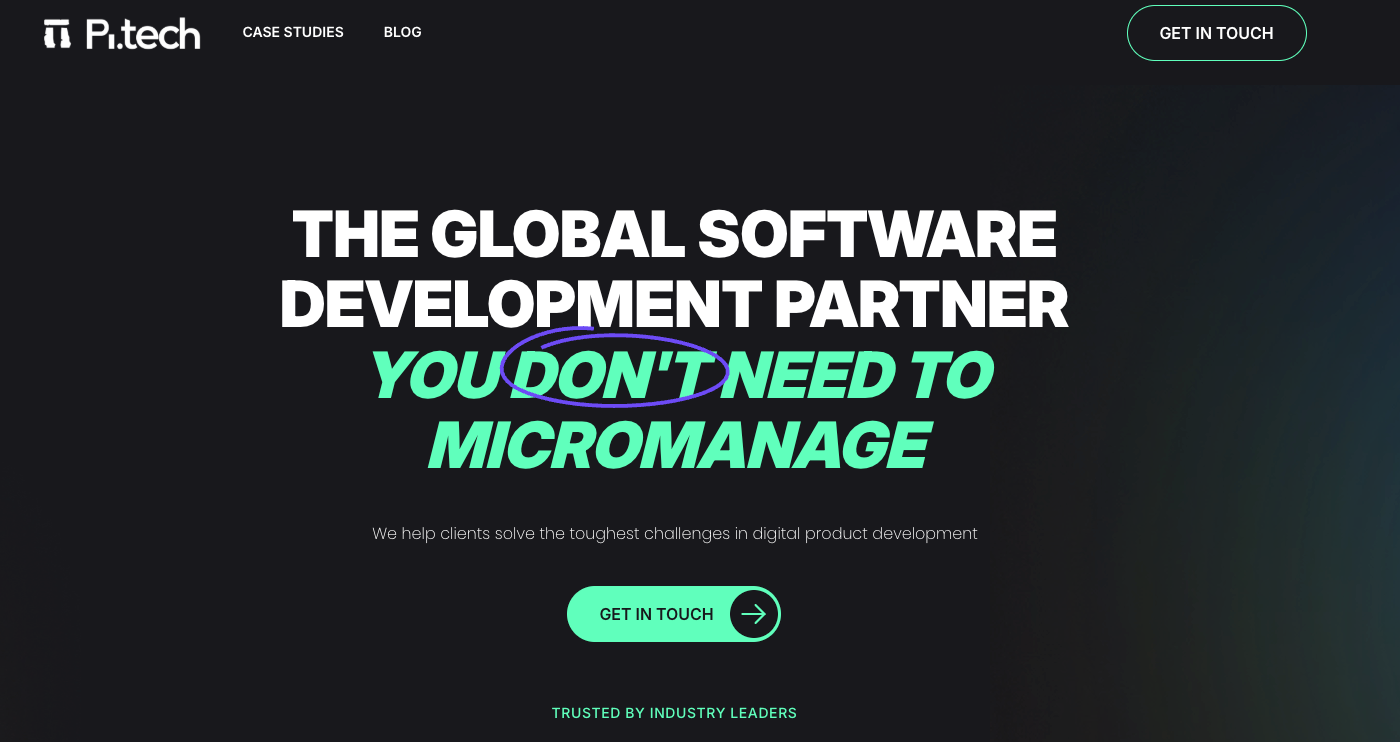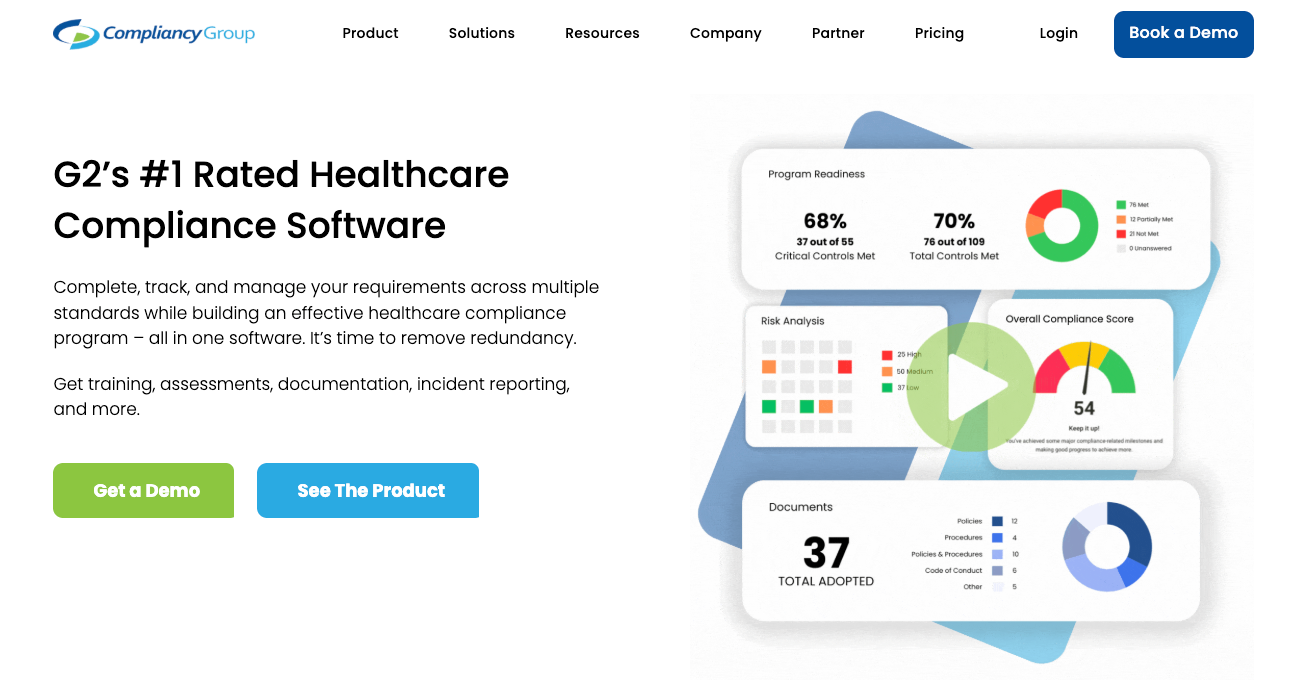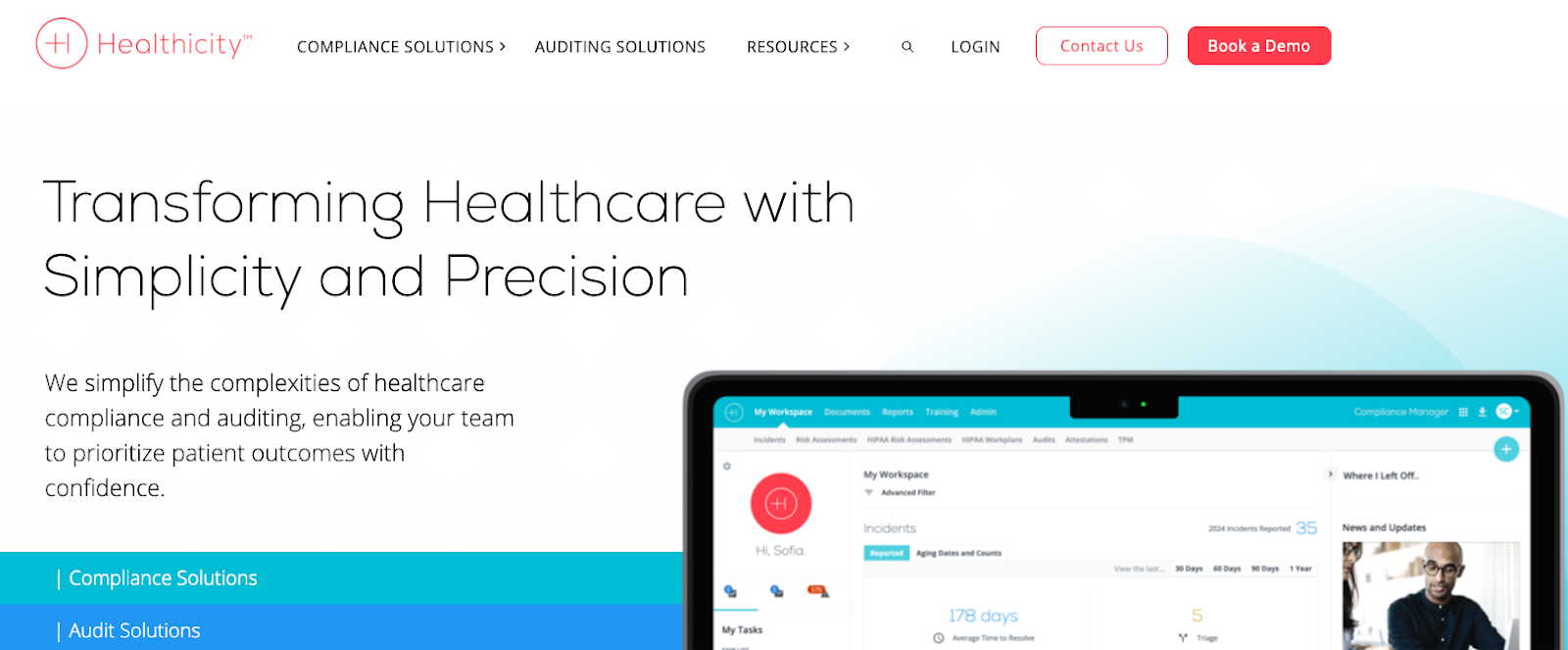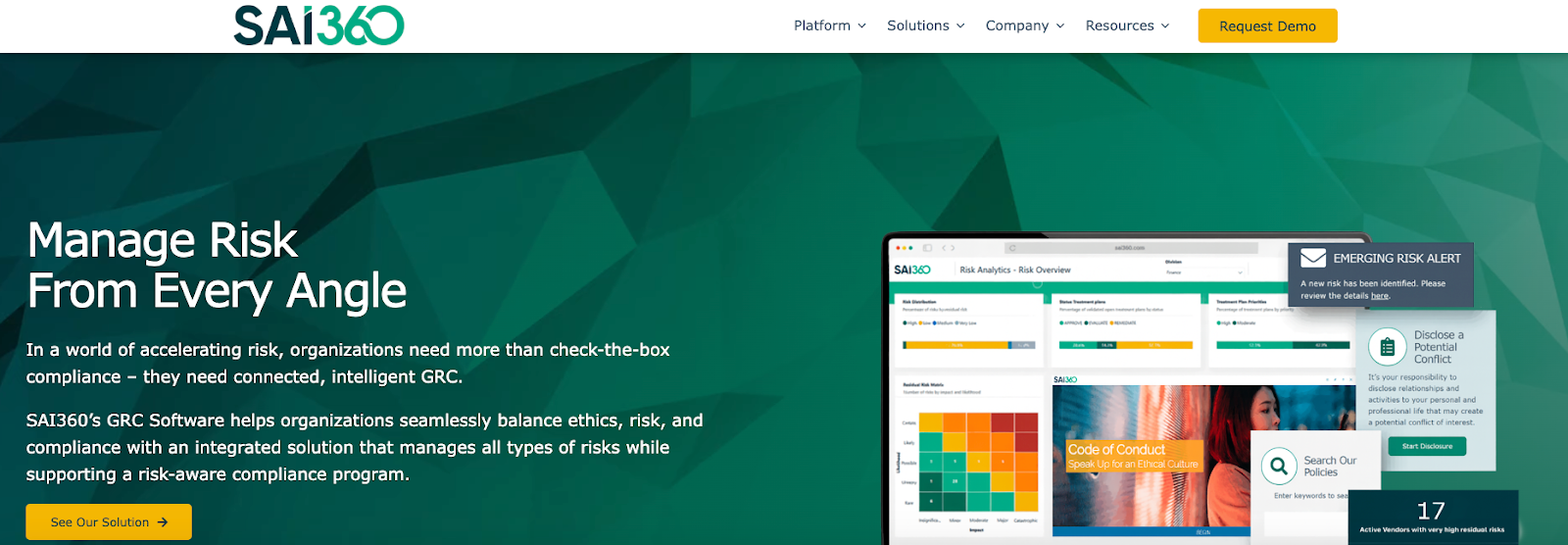Healthcare compliance today is a moving target shaped by HIPAA, FDA oversight, state privacy rules, and rising cybersecurity demands. For providers and health tech companies, the challenge is clear: stay compliant without slowing down care delivery.
The right software partner can change compliance from a constant headache into a built-in strength. Instead of racing to meet deadlines or bracing for audit risks, you can create systems that track, document, and enforce compliance as part of daily workflows.
But here’s the catch: not every software company understands the nuances of healthcare. You need a partner with both technical expertise and a deep grasp of how clinical processes intersect with regulations. This guide highlights the top healthcare compliance software development companies that know how to strike that balance.
Key Takeaways
- Healthcare-Specific Expertise Is Non-Negotiable: Generic compliance platforms miss critical healthcare nuances; choose partners with proven HIPAA, FDA, and healthcare regulatory experience.
- Integration Capabilities Determine Success: Your compliance software must connect seamlessly with EHRs, billing systems, and existing healthcare IT infrastructure.
- Custom Solutions Outperform One-Size-Fits-All: Healthcare organizations with unique workflows and compliance requirements benefit most from tailored development approaches.
- Ongoing Support Matters More Than Initial Implementation: Regulations change constantly, select partners who provide continuous updates and strategic compliance guidance.
- Pi Tech's Specless Engineering Delivers Faster Compliance: Our adaptive development methodology gets compliant solutions running while others are still writing specifications.
1. Pi Tech

At Pi Tech, we don't just build compliance software. We architect complete compliance ecosystems that integrate seamlessly into your healthcare operations.
Our approach recognizes that true compliance is about creating systems that make regulatory adherence a natural outcome of efficient workflows.
What makes our compliance solutions different starts with our deep understanding of healthcare operations. We've spent years working with hospitals, clinics, medical device manufacturers, and health tech companies to understand how compliance intersects with clinical care, patient experience, and operational efficiency. This expertise shapes every solution we build.
Our Specless Engineering methodology means we start developing your compliance infrastructure immediately, adapting as we learn your specific requirements. While other firms spend months documenting specifications, we're already building, testing, and refining solutions that address your most critical compliance gaps.
We specialize in HIPAA compliance platforms, FDA regulatory tracking systems, quality management solutions, and integrated audit management tools. Our systems don't just document compliance. They actively prevent violations through intelligent workflows, automated monitoring, and proactive risk identification.
Every Pi Tech compliance project is staffed with senior developers who understand both the technical complexities of compliance software and the operational realities of healthcare delivery. This combination ensures our solutions work in the real world, not just in theory.
Why Pi Tech Excels in Healthcare Compliance:
- Regulatory Expertise Across Multiple Frameworks: Deep knowledge of HIPAA, FDA, HITRUST, ISO, and state-specific healthcare regulations built into every solution
- Rapid Deployment Without Compromising Quality: Our Specless Engineering approach delivers working compliance solutions faster than traditional development methods
- Seamless Healthcare IT Integration: Connect with any EHR, billing system, or clinical application without disrupting existing workflows
- Proactive Compliance Management: Systems that identify and address compliance risks before they become violations
- Continuous Regulatory Updates: Ongoing support ensures your compliance software evolves with changing regulations
Ready to transform compliance from a burden into a strategic advantage? Contact Pi Tech today to discuss how our custom compliance solutions can protect your organization while improving operational efficiency.
2. Compliancy Group

Since 2005, Compliancy Group has been helping healthcare organizations take the stress out of HIPAA compliance. Their flagship platform, The Guard, combines smart automation with human guidance, making it one of the most practical solutions for organizations that don’t have the time, or the expertise, to manage compliance alone.
What makes Compliancy Group stand out is its human-first approach. Every client is paired with a dedicated compliance coach who walks them through setup, training, and ongoing compliance tasks. Instead of struggling with regulations or guessing what auditors expect, organizations get real-time coaching alongside powerful software tools.
The Guard covers the full spectrum of HIPAA requirements: risk assessments, policy and procedure management, employee training, breach response, and ongoing monitoring. Much of the heavy lifting is automated, but the platform stays flexible enough to adapt to each organization’s unique workflows.
Another differentiator is Compliancy Group’s “Seal of Compliance” verification program. Once clients meet all requirements, they receive a badge they can display publicly, a visible way to reassure patients, partners, and regulators of their commitment to data protection.
Serving everyone from small private practices to large healthcare networks, Compliancy Group’s scalable model means you can start with the basics and expand as your compliance needs grow. It’s not just compliance software, it’s a partnership that builds confidence while keeping you audit-ready.
Why Compliancy Group Stands Out:
- Dedicated Compliance Coaches: Personal guidance ensures proper implementation and ongoing compliance maintenance
- Comprehensive HIPAA Coverage: Addresses all aspects of HIPAA including Security Rule, Privacy Rule, and Breach Notification requirements
- Automated Risk Assessments: Streamlined process for identifying and addressing potential compliance vulnerabilities
- Employee Training Integration: Built-in training modules ensure staff understand compliance responsibilities
- Compliance Verification Program: Third-party validation provides confidence to patients and partners
3. Healthicity

Healthicity offers one of the most comprehensive compliance management platforms built specifically for healthcare providers, health plans, and business associates. Their cloud-based system centralizes all compliance activities, covering HIPAA, OSHA, and quality reporting programs, so organizations don’t have to juggle multiple tools or siloed processes.
Where Healthicity really shines is in supporting multi-facility organizations with complex regulatory needs. Their platform goes beyond simple task tracking, offering automated audit management, real-time compliance monitoring, and integrated incident reporting.
Instead of reacting to compliance issues after the fact, Healthicity emphasizes proactive risk management with continuous oversight and intelligent alerts.
With more than 70,000 users across hundreds of organizations, the platform has proven scalability; from small practices to sprawling health systems. Clients can take advantage of pre-built compliance programs and workflows, then tailor them to their own needs without losing regulatory rigor.
Healthicity also puts a strong focus on visibility and reporting. Leadership teams can access dashboards that track compliance across every department and facility, helping them stay audit-ready while spotting improvement opportunities. For healthcare organizations managing compliance at scale, Healthicity provides the tools to stay ahead of regulatory complexity.
Why Healthicity Leads:
- Multi-Framework Compliance: Single platform manages HIPAA, OSHA, quality reporting, and other regulatory requirements
- Scalable Architecture: Grows from single locations to multi-facility health systems without platform changes
- Automated Audit Management: Streamlines internal and external audit processes with built-in workflows
- Real-Time Compliance Monitoring: Continuous tracking identifies issues before they become violations
- Comprehensive Reporting Suite: Detailed analytics support decision-making and audit documentation
4. SAI360 (formerly SAI Global)

SAI360 brings enterprise-grade governance, risk, and compliance (GRC) capabilities to healthcare organizations. Their integrated risk management platform helps healthcare providers manage compliance across multiple regulatory frameworks while maintaining operational efficiency.
The platform combines compliance management with broader risk management capabilities, allowing healthcare organizations to take a holistic approach to regulatory compliance. SAI360's solutions include policy management, incident tracking, audit management, and third-party risk management; all within a unified platform that provides comprehensive visibility into organizational compliance status.
Their healthcare-specific modules address unique industry challenges, including patient safety, clinical risk management, and healthcare-specific regulatory requirements. The platform's workflow automation capabilities reduce manual compliance tasks while ensuring consistent application of compliance procedures across the organization.
SAI360 serves some of the largest healthcare systems globally, demonstrating their ability to handle complex, multi-jurisdictional compliance requirements. Their platform supports compliance with regulations across different countries and regions, making them particularly valuable for healthcare organizations with international operations.
Why SAI360 Excels:
- Enterprise GRC Platform: Comprehensive governance, risk, and compliance management in one system
- Healthcare-Specific Modules: Purpose-built solutions for clinical risk and patient safety management
- Global Compliance Capabilities: Supports international healthcare organizations with multi-jurisdictional requirements
- Integrated Risk Management: Links compliance activities with broader organizational risk management
- Advanced Analytics and Reporting: Sophisticated tools for compliance trending and predictive risk analysis
5. LogicGate

LogicGate brings flexibility to healthcare compliance with its no-code Risk Cloud platform, empowering organizations to design custom workflows without relying heavily on IT teams. Instead of being locked into rigid systems, compliance leaders can quickly build, adapt, and scale processes that match their organization’s exact needs.
The platform’s visual workflow builder is a major strength, enabling compliance teams to create and update processes as regulations evolve, thereby reducing implementation times and lowering maintenance costs. Healthcare organizations can respond to new compliance demands in weeks rather than months.
LogicGate also offers pre-built applications for core compliance areas like HIPAA risk assessments, vendor risk management, and policy management. These apps can be customized or extended, giving organizations a balance of ready-to-use functionality and flexibility.
Designed with collaboration in mind, LogicGate makes it easier for cross-functional teams to work together on compliance initiatives. And with its robust API integrations, the platform fits seamlessly into existing IT infrastructures, a big advantage for mid-size and large healthcare organizations that already run complex systems.
Why LogicGate Stands Out:
- No-Code Flexibility: Build and modify compliance workflows without programming knowledge
- Rapid Deployment: Pre-built applications accelerate time to value for common compliance needs
- Visual Process Design: Intuitive interface makes complex compliance workflows understandable
- Strong Integration Capabilities: APIs connect with existing healthcare IT systems
- Collaborative Compliance Management: Features that facilitate cross-team compliance efforts
6. MetricStream

MetricStream provides comprehensive GRC solutions with strong healthcare industry focus. Their platform addresses compliance management, risk management, audit management, and quality management within an integrated framework designed specifically for healthcare organizations.
The company's healthcare solutions cover the full spectrum of regulatory compliance including HIPAA, FDA regulations, clinical trial compliance, and quality system regulations. MetricStream's approach emphasizes connecting compliance activities with business objectives, helping organizations see compliance as a strategic advantage rather than a burden.
Their platform includes advanced analytics capabilities that provide predictive insights into compliance risks and trends. This proactive approach helps healthcare organizations address potential issues before they result in violations or patient safety concerns. MetricStream also offers industry-specific content libraries that accelerate implementation and ensure alignment with best practices.
The platform serves community hospitals, large academic medical centers, and pharmaceutical companies. Their ability to handle complex organizational structures and diverse compliance requirements makes them particularly suitable for large healthcare enterprises.
Why MetricStream Leads:
- Comprehensive Healthcare Coverage: Addresses clinical, operational, and research compliance requirements
- Predictive Analytics: Advanced algorithms identify compliance risks before they materialize
- Industry Content Libraries: Pre-built compliance content accelerates implementation
- Flexible Deployment Options: Available as cloud, on-premise, or hybrid deployments
- Strong Pharmaceutical and Medical Device Support: Specialized modules for life sciences compliance
7. ServiceNow Healthcare

ServiceNow extends its powerful platform capabilities to healthcare compliance and risk management. Their solution combines IT service management with compliance workflows, creating an integrated approach to healthcare technology and regulatory compliance.
The platform's strength lies in its ability to connect compliance management with broader organizational workflows. ServiceNow's healthcare solutions include automated compliance tracking, integrated risk assessments, and seamless connection with clinical and operational systems. This integration reduces duplicate work and ensures compliance considerations are embedded in daily operations.
ServiceNow's workflow automation capabilities transform manual compliance processes into efficient, tracked, and auditable digital workflows. The platform includes machine learning capabilities that help identify patterns and predict potential compliance issues based on historical data and current trends.
Their solution scales effectively across large healthcare enterprises, with many major health systems using ServiceNow for both IT service management and compliance management. The platform's familiar interface and extensive customization options make it adaptable to various organizational needs.
Why ServiceNow Excels:
- Platform Integration: Combines compliance with IT service management and operational workflows
- Powerful Automation Engine: Reduces manual compliance tasks through sophisticated workflow automation
- Machine Learning Capabilities: AI-powered insights improve compliance prediction and prevention
- Enterprise Scalability: Proven ability to handle large, complex healthcare organizations
- Extensive Ecosystem: Large partner network and marketplace for additional functionality
Core Features Every Healthcare Compliance Platform Needs
When choosing healthcare compliance software, certain features aren’t optional; they’re the backbone of effective regulatory adherence and operational efficiency. A strong platform should deliver these essentials:
Risk Assessment and Management
Every compliance strategy starts here. Your platform should identify, evaluate, and track risks automatically with tools like risk scoring, mitigation planning, and continuous monitoring. This ensures potential issues are addressed before they escalate into costly violations.
Policy and Procedure Management
Up-to-date policies are the cornerstone of compliance. Look for features like version control, automated distribution, acknowledgment tracking, and scheduled reviews. The best platforms go further by linking policies directly to training modules and audit activities.
Audit Management and Tracking
Audits don’t have to be disruptive. A capable system should include audit scheduling, checklist management, documentation tracking, corrective action monitoring, and comprehensive reporting. Tying audits to risk assessments keeps the focus on high-risk areas where oversight matters most.
Training and Education Modules
Compliance only works if staff understand their responsibilities. Role-based training, certification tracking, refresher modules, and integration with HR systems make it easy to deliver and manage ongoing education, starting with onboarding and continuing as regulations change.
Incident and Breach Management
When things go wrong, structured responses are critical. Look for incident logging, investigation workflows, root cause analysis, breach assessments, and automated notifications to regulators. These workflows ensure consistent, timely, and compliant responses.
Reporting and Analytics
Leaders need visibility, not guesswork. Real-time dashboards, customizable reports, and predictive analytics highlight trends, spot risks early, and move compliance from a reactive process to a proactive advantage.
Benefits of Custom Healthcare Compliance Solutions
While off-the-shelf compliance platforms can get you started quickly, they often fall short once your organization grows or faces complex regulatory challenges.
Custom healthcare compliance solutions deliver deeper value over the long term.
Here are the key advantages:
- Seamless Integration With Existing Systems: Custom solutions connect directly with your EHR, billing software, and clinical applications. This eliminates duplicate data entry, reduces human error, and ensures compliance tasks fit naturally into clinical workflows without slowing down patient care.
- Tailored To Your Regulatory Environment: Different organizations face different obligations depending on services offered, state laws, and patient populations. Custom software is designed around your specific requirements, cutting unnecessary complexity while ensuring complete coverage of the rules that apply to you.
- Aligned With Clinical Workflows: Compliance shouldn’t disrupt how your staff already operates. Custom tools adapt to established processes, making it easier for employees to adopt the system. This alignment improves efficiency and ensures compliance enhances, rather than hinders, daily operations.
- Scalable For Future Growth: As your organization expands, adding new facilities, services, or care delivery models, custom solutions grow with you. This flexibility prevents costly platform migrations or disruptive overhauls when compliance needs evolve.
- Competitive Differentiation: Off-the-shelf tools may keep you compliant, but custom-built solutions demonstrate a higher level of commitment. They show patients, partners, and regulators that your organization prioritizes compliance as part of its identity, strengthening trust and setting you apart from competitors.
How to Select the Right Healthcare Compliance Partner
Choosing the right partner can make the difference between a system that merely meets minimum standards and one that turns compliance into a lasting competitive advantage. Here are the key factors to evaluate:
Industry Expertise
Look for a partner with proven experience in healthcare compliance, not just general software development. They should understand HIPAA, FDA regulations, OSHA requirements, and state-specific privacy laws, and know how these rules intersect with clinical workflows.
Track Record of Success
Ask for case studies, client references, or measurable results. A reliable partner will have a history of delivering compliance solutions that stand up to audits and improve operational efficiency.
Customization Capabilities
Every healthcare organization has unique needs. Your partner should offer the ability to tailor workflows, reporting, and integrations rather than forcing you into rigid, one-size-fits-all solutions.
Integration With Existing Systems
The best partner can seamlessly connect compliance software to your EHR, billing systems, and other clinical tools. This prevents data silos, reduces errors, and ensures compliance activities don’t disrupt care delivery.
Scalability and Flexibility
Select a partner who can support your organization as it grows. Their solutions should adapt to new service lines, geographic expansions, and evolving regulatory requirements without requiring costly overhauls.
Ongoing Support and Training
Compliance doesn’t end at launch. A strong partner provides continuous support, staff training, and updates to keep your organization aligned with changing regulations.
Security and Reliability
Since compliance software often manages sensitive patient data, verify that your partner follows best practices in data security, encryption, and system reliability to protect both compliance records and patient trust.
The right healthcare compliance partner combines technical expertise with regulatory insight, scalability, and a commitment to ongoing support. As you explore the top companies highlighted in this guide, use these criteria to identify the partner who can help you achieve both compliance and operational excellence.
Implementation Best Practices for Healthcare Compliance Software
Successful implementation requires a structured approach that balances stakeholder involvement, thoughtful planning, and continuous improvement. Here are the best practices to follow:
Engage Stakeholders Early
Compliance touches everyone; from frontline clinicians to executives. Map out all key stakeholders, understand their pain points, and involve them in the solution design. Early engagement ensures the software reflects real-world needs rather than abstract requirements.
Conduct a Current-State Assessment
Before implementation, document existing compliance processes, identify gaps, and note the workarounds staff rely on. This assessment provides a baseline for measuring improvements and ensures the new system addresses real weaknesses, not just perceived ones.
Roll Out in Phases
Avoid enterprise-wide deployments on day one. Start with pilot departments or select compliance areas that are high-visibility but low-complexity. Quick wins build trust, demonstrate value, and provide lessons that make subsequent phases smoother and more effective.
Prioritize Training and Change Management
Even the most advanced system fails if staff don’t use it correctly. Provide role-specific training, appoint super-users to support their peers, and embed compliance training into ongoing professional development. Treat training as a continuous process, not a one-time event.
Define Metrics and Monitor Continuously
Establish clear success metrics from the start, such as fewer audit findings, faster incident resolution, or improved training completion rates. Build monitoring into the system so progress is visible to leadership and issues are caught early.
Why Pi Tech Is the Right Healthcare Compliance Partner
At Pi Tech, we understand that healthcare compliance isn’t just about avoiding penalties. It’s about protecting patients, supporting staff, and allowing your organization to stay focused on delivering exceptional care. That philosophy drives every solution we create.
Our Specless Engineering methodology means we start solving compliance challenges immediately. While other firms spend months gathering requirements, we’re already building and testing solutions that address your most pressing gaps. This approach gets you to compliance faster while keeping the flexibility to adjust as needs evolve.
We also bring deep healthcare expertise to every project. Our senior developers understand not only software but also the regulatory frameworks and operational realities that shape healthcare. That includes:
- HIPAA compliance and privacy requirements
- FDA regulations and quality reporting standards
- Risk management and audit readiness
- The interplay between compliance processes and clinical workflows
This knowledge ensures that what we build works in real healthcare environments, not just in theory.
Our custom development approach means your compliance solution is designed around your organization, not the other way around. Instead of forcing you into rigid platform limitations, we deliver systems that:
- Integrate seamlessly with your existing applications
- Include only the features you actually need
- Scale as your services and compliance obligations expand
Most importantly, we remain a partner long after deployment. Compliance is constantly evolving, and we make sure your solutions evolve with it through:
- Ongoing support and maintenance
- Regular updates aligned with new regulatory requirements
- Strategic guidance to improve efficiency while staying audit-ready
With Pi Tech, you gain a partner committed to helping your organization maintain regulatory excellence and operational strength for the long term.
Final Thoughts
Healthcare compliance software has evolved from simple documentation tools into platforms that turn regulatory adherence into operational strength. The right partner doesn’t just help you meet today’s requirements. They prepare you for tomorrow’s challenges.
The companies featured in this guide bring different strengths:
- Comprehensive GRC platforms for broad compliance management
- Specialized HIPAA solutions with built-in expertise
- Custom-built systems designed for complex healthcare environments
For organizations with unique needs or growth plans, custom development delivers the greatest long-term value. Tailored solutions align with your workflows, integrate into existing systems, and scale as regulations and operations evolve.
Pi Tech specializes in building these kinds of solutions. Our Specless Engineering methodology delivers results faster, and our senior developers ensure every system fits seamlessly into real healthcare environments.
Ready to make compliance a competitive advantage? Contact Pi Tech today to explore how custom compliance software can protect your organization while boosting efficiency.
Frequently Asked Questions
What's the Difference Between Healthcare Compliance Software and General GRC Platforms?
Healthcare compliance software is specifically designed for healthcare regulations like HIPAA, FDA requirements, and clinical quality standards. These solutions include healthcare-specific workflows, terminology, and integration capabilities that general GRC platforms lack. While general platforms can be configured for healthcare, purpose-built solutions require less customization and provide better alignment with healthcare operations.
How Much Does Healthcare Compliance Software Typically Cost?
Pricing depends on organization size, deployment model, and feature requirements. SaaS platforms usually range from $500 to $10,000+ per month for enterprise-level solutions. Custom-built systems start around $75,000 and can exceed $500,000 for large-scale deployments. While the upfront investment can be significant, many organizations see ROI through fewer audit findings, reduced penalties, and more efficient compliance processes.
Can Healthcare Compliance Software Help with Both HIPAA and FDA Compliance?
Yes, many healthcare compliance platforms address multiple regulatory frameworks, including HIPAA, FDA, OSHA, and state-specific requirements. The key is selecting a platform that handles the specific regulations affecting your organization. Some platforms excel at privacy compliance (HIPAA) while others focus on quality systems (FDA). Custom solutions can be designed to address your exact regulatory mix without unnecessary complexity.

.png)





